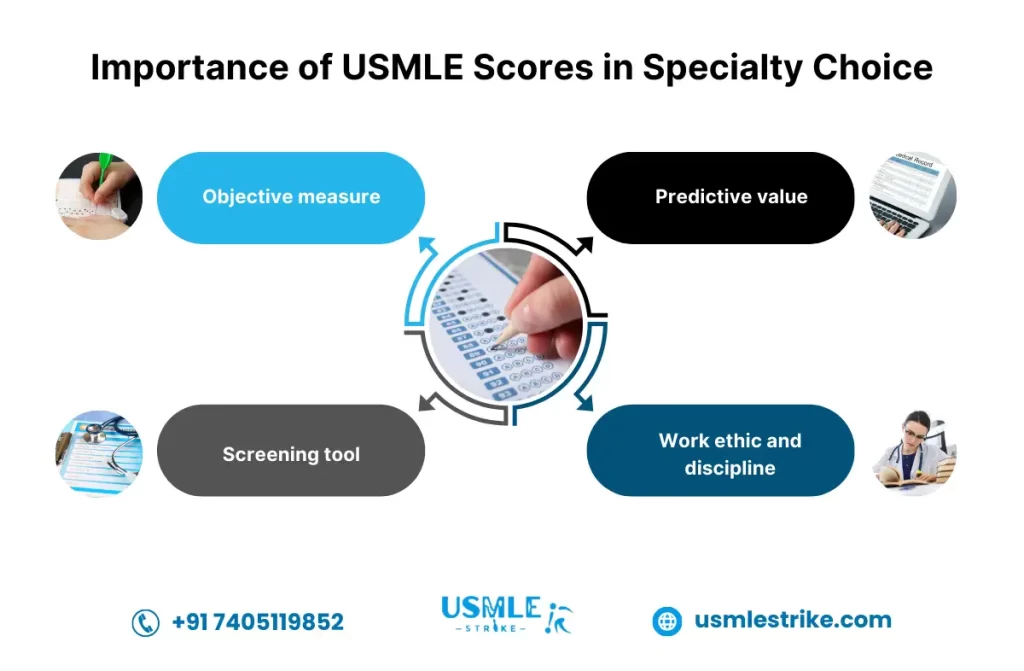USMLE Step Scores by Specialty , Choosing a medical specialty is one of the most important decisions aspiring doctors face. And one of the biggest factors in that decision is the USMLE step scores by specialty. These scores are more than just numbers—they often determine your path forward in medicine. Whether you’re aiming for dermatology, family medicine, or anything in between, understanding how scores align with specialties is key. In this guide, we’ll explore everything you need to know about USMLE step scores by specialty and how to make them work for you.
Why Choosing the Right Specialty is Crucial
Medicine is a long journey, and your specialty will shape your entire career. The right specialty means balancing your personal interests, lifestyle preferences, and career goals. It’s not just about what excites you intellectually but also about what fits your personality. For example:
- High-intensity specialties: Fields like surgery or emergency medicine require quick decision-making under pressure. If you thrive in fast-paced environments, this might suit you.
- Patient-centered specialties: Specialties like pediatrics or family medicine focus on building long-term relationships. If you’re a people person, these might align with your strengths.
But there’s another layer: USMLE step scores by specialty. These scores can open or close doors, so understanding their role is essential.
Factors to Consider When Choosing a Specialty
Before diving into specific scores, think about the bigger picture. Here are some key factors:
- Passion: What excites you about medicine? Some students gravitate toward procedures, while others prefer diagnosing complex cases.
- Lifestyle: Specialties vary greatly in work hours. Radiology and pathology often have more predictable schedules, while surgery can mean long, irregular hours.
- Competitiveness: Specialties like dermatology and orthopedic surgery are highly competitive, requiring top-notch scores.
- Geography: Some specialties are more in demand in certain locations. For example, primary care is often needed more in rural areas.
Your scores, combined with these considerations, will help you find a specialty that’s the right fit.
Importance of USMLE Scores in Specialty Choice
The USMLE step scores by specialty act as gatekeepers for many residency programs. Higher scores often translate to more opportunities, especially in competitive fields. But why are these scores so important?
- Objective measure: Residency programs use USMLE scores as a standardized way to compare applicants.
- Predictive value: High scores are believed to predict success in exams during residency and even board certification.
- Screening tool: Many programs have score cutoffs to narrow down the pool of applicants.
For example, a 240+ on Step 1 might make you competitive for radiology, while a 250+ might be necessary for dermatology. Knowing this can help you set realistic goals.
Average USMLE Step 1 Scores by Specialty
Step 1 scores often set the stage for residency applications. While Step 1 has shifted to pass/fail, historical data still offers insights into competitiveness. Here are average Step 1 scores for popular specialties:
- Family Medicine: 220-230
- Internal Medicine: 230-240
- General Surgery: 240-250
- Dermatology: 250+
- Orthopedic Surgery: 250+
These averages highlight the importance of aligning your goals with your performance. While USMLE step scores by specialty are crucial, they’re not the whole story—we’ll dive into non-score factors later.

What Is the Mean Score for Step 2?
Step 2 CK (Clinical Knowledge) scores have gained more importance with Step 1’s shift to pass/fail. The usmle step 2 scores by specialty often reflect clinical skills and readiness for patient care. Here are some examples of mean Step 2 scores:
- Pediatrics: Around 245
- Emergency Medicine: 245-250
- Neurology: 240-245
- Plastic Surgery: 255+
Higher scores on Step 2 CK can sometimes compensate for a lower Step 1 score, making it a critical part of your application.
USMLE Step 2 CK Scores and Their Significance
Residency programs value Step 2 CK because it demonstrates your ability to apply knowledge in clinical settings. Unlike Step 1, which is more theoretical, Step 2 CK focuses on:
- Patient management: Testing your understanding of treatment plans.
- Problem-solving: Evaluating how you approach clinical scenarios.
- Readiness for residency: Indicating whether you can handle the responsibilities of a first-year resident.
For competitive specialties, high usmle step 2 scores by specialty are often non-negotiable. For example, scoring above 250 can make a significant difference for specialties like urology or anesthesiology.
Specialty Competitiveness and Score Trends
Specialty competitiveness is directly tied to the USMLE step scores by specialty. Here’s a breakdown of how competitiveness aligns with scores:
- Highly competitive specialties: Dermatology, neurosurgery, and orthopedic surgery require scores above 250 for a strong chance.
- Moderately competitive specialties: Fields like psychiatry, OB-GYN, and emergency medicine often fall in the 240-250 range.
- Less competitive specialties: Family medicine and pathology may accept scores closer to 220-230.
Understanding these trends can help you prioritize your study efforts and tailor your application strategy.
Specialty Flexibility Based on Scores
What happens if your scores don’t meet the average for your desired specialty? Don’t panic. There’s often room for flexibility:
- Broader applications: Apply to a mix of competitive and less competitive programs.
- Consider subspecialties: Some fields have less competitive entry points, like preliminary medicine or transitional year programs.
- Leverage other strengths: Strong letters of recommendation, research experience, and personal statements can make up for slightly lower scores.
For example, if your dream is dermatology but your scores fall short, consider a research year or explore fields like internal medicine with a dermatology focus.
Balancing Scores with Passion and Fit
Scores are important, but they shouldn’t overshadow your personal interests and career goals. Balancing your passion with your usmle score and specialty is critical for long-term satisfaction. Consider these tips:
- Self-reflection: Think about what excites you most about medicine. Is it patient interaction, research, or procedures?
- Shadowing: Spend time in various specialties to understand the day-to-day realities.
- Mentorship: Seek advice from mentors who can provide perspective on balancing scores with passion.
Remember, a fulfilling career is about more than just numbers.
Non-Score Factors Influencing Specialty Choice
While scores matter, they’re not everything. Here are some other factors to consider:
- Clinical experience: Strong performance in rotations can impress residency programs.
- Research: Publications and presentations can strengthen your application, especially in competitive fields.
- Networking: Connections with faculty and residents can open doors.
- Personal statement: A compelling narrative about your journey can make your application stand out.
These elements, combined with your usmle step 2 scores by specialty, can create a well-rounded application.
Strategies to Improve Your Competitiveness
If your scores are lower than expected, don’t lose hope. Here are actionable strategies to boost your competitiveness:
- Study smarter: Focus on high-yield topics and use trusted resources like UWorld and First Aid.
- Seek feedback: Review your practice tests to identify weak areas.
- Strengthen your CV: Engage in research, leadership roles, or volunteer work.
- Ace interviews: Practice common questions and present yourself confidently.
These efforts can help you maximize your chances, regardless of your usmle score and specialty.
Conclusion
Choosing a specialty is a big decision, and understanding the USMLE step scores by specialty is a critical part of the process. Whether your scores align perfectly with your dream specialty or you need to adjust your strategy, remember that success comes from a combination of hard work, passion, and persistence. And as always, stay focused on your goals and never stop striving for excellence—because that’s what being part of the USMLE Strike is all about.
Want to know more details about the USMLE Exam check our Instagram page!





